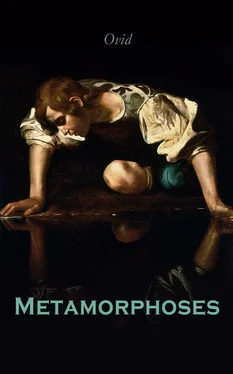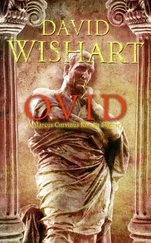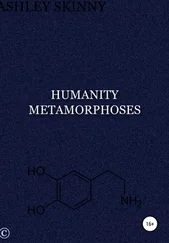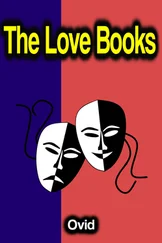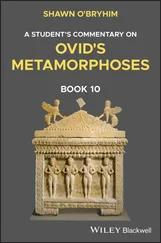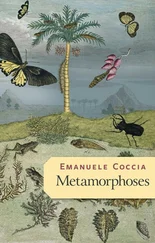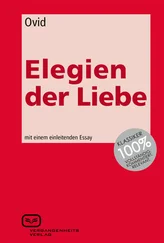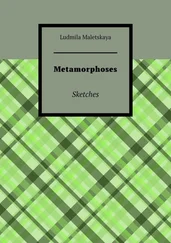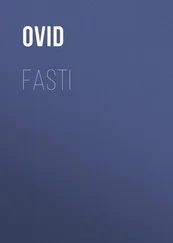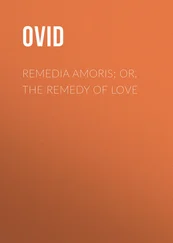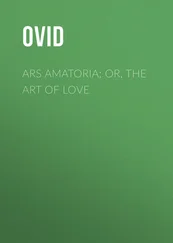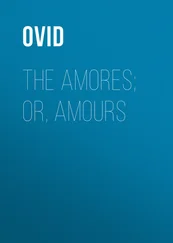Ovid - Metamorphoses
Здесь есть возможность читать онлайн «Ovid - Metamorphoses» — ознакомительный отрывок электронной книги совершенно бесплатно, а после прочтения отрывка купить полную версию. В некоторых случаях можно слушать аудио, скачать через торрент в формате fb2 и присутствует краткое содержание. Жанр: unrecognised, на английском языке. Описание произведения, (предисловие) а так же отзывы посетителей доступны на портале библиотеки ЛибКат.
- Название:Metamorphoses
- Автор:
- Жанр:
- Год:неизвестен
- ISBN:нет данных
- Рейтинг книги:3 / 5. Голосов: 1
-
Избранное:Добавить в избранное
- Отзывы:
-
Ваша оценка:
- 60
- 1
- 2
- 3
- 4
- 5
Metamorphoses: краткое содержание, описание и аннотация
Предлагаем к чтению аннотацию, описание, краткое содержание или предисловие (зависит от того, что написал сам автор книги «Metamorphoses»). Если вы не нашли необходимую информацию о книге — напишите в комментариях, мы постараемся отыскать её.
Metamorphoses — читать онлайн ознакомительный отрывок
Ниже представлен текст книги, разбитый по страницам. Система сохранения места последней прочитанной страницы, позволяет с удобством читать онлайн бесплатно книгу «Metamorphoses», без необходимости каждый раз заново искать на чём Вы остановились. Поставьте закладку, и сможете в любой момент перейти на страницу, на которой закончили чтение.
Интервал:
Закладка:
When he found that these attempts were made in vain, and that the funeral pile was being prepared, and that her limbs were about to be burnt in the closing flames, then, in truth, he gave utterance to sighs fetched from the bottom of his heart (for it is not allowed the celestial features to be bathed with tears). No otherwise than, as when an axe, poised from the right ear of the butcher , dashes to pieces, with a clean stroke, the hollow temples of the sucking calf, while the dam looks on. Yet after Phœbus had poured the unavailing perfumes on her breast, when he had given the last embrace and had performed the due obsequies prematurely hastened, he did not suffer his own offspring to sink into the same ashes; but he snatched the child from the flames and from the womb of his mother, and carried him into the cave of the two-formed Chiron. And he forbade the raven, expecting for himself the reward of his tongue that told no untruth, to perch any longer among the white birds.
EXPLANATION.
History does not afford us the least insight into the foundation of the story of Coronis transformed into a crow, for making too faithful a report, nor that of the raven changed from white to black, II. 632-651 for talking too much. If they are based upon some events which really happened, we must be content to acknowledge that these Fables refer to the history of two persons entirely unknown to us, and who, perhaps, lived as far back as the time of the daughters of Cecrops, to whom the story seems to bear some relation. Coronis being the name of a crow as well as of a Nymph, Lucian and other writers have fabled that her son, Æsculapius, was produced from the egg of that bird, and was born in the shape of a serpent, under which form he was very generally worshipped.
FABLE X.
Ocyrrhoë, the daughter of the Centaur Chiron, attempting to predict future events, tells her father the fate of the child Æsculapius, on which the Gods transform her into a mare.
In the meantime the half-beast Chiron was proud of a pupil of Divine origin, and rejoiced in the honor annexed to the responsibility. Behold! the daughter of the Centaur comes, having her shoulders covered with her yellow hair; whom once the nymph Chariclo, 74having borne her on the banks of a rapid stream, called Ocyrrhoë. She was not contented to learn her father’s arts only; but she sang the secrets of the Fates. Therefore, when she had conceived in her mind the prophetic transports, and grew warm with the God, whom she held confined within her breast, she beheld the infant, and she said, “Grow on, child, the giver of health to the whole world; the bodies of mortals shall often owe their own existence to thee. To thee will it be allowed to restore life when taken away; and daring to do that once against the will of the Gods, thou wilt be hindered by the bolts of thy grandsire from being able any more to grant that boon . And from a God thou shalt become a lifeless carcase; and a God again , who lately wast a carcase; and twice shalt thou renew thy destiny. Thou likewise, dear father, now immortal, and produced at thy nativity, on the condition of enduring for ever, wilt then wish that thou couldst die, when thou shalt be II. 652-675 tormented on receiving the blood of a baneful serpent 75in thy wounded limbs; and the Gods shall make thee from an immortal being , subject to death, and the three Goddesses 76shall cut thy threads.”
Something still remained in addition to what she had said. She heaved a sigh from the bottom of her breast, and the tears bursting forth, trickled down her cheeks, and thus she said: “The Fates prevent me, and I am forbidden to say any more, and the use of my voice is precluded. My arts, which have brought the wrath of a Divinity upon me, were not of so much value; I wish that I had not been acquainted with the future. Now the human shape seems to be withdrawing from me; now grass pleases me for my food; now I have a desire to range over the extended plains; I am turned into a mare, and into a shape kindred to that of my father . But yet, why entirely? For my father partakes of both forms.”
As she was uttering such words as these, the last part of her complaint was but little understood; and her words were confused. And presently neither were they words indeed, nor did it appear to be the voice of a mare, but of one imitating a mare. And in a little time she uttered perfect neighing, and stretched her arms upon the grass. Then did her fingers grow together, and a smooth hoof united five nails in one continued piece of horn. The length of her face and of her neck increased; the greatest part of her long hair became a tail. And as the hairs lay scattered about her neck, they were transformed into a mane lying upon the right side; at once both her voice and her shape were changed. And this wondrous change gave her the new name of Enippe .
FABLE XI.
Mercury, having stolen the oxen of Apollo, and Battus having perceived the theft, he engages him, by a present, to keep the matter secret. Mistrusting, however, his fidelity, he assumes another shape, and tempting him with presents, he succeeds in corrupting him. To punish his treachery, the God changes him into a touchstone.
The Philyrean 77hero wept, and in vain, God of Delphi, implored thy assistance; but neither couldst thou reverse the orders of great Jupiter, nor, if thou couldst have reversed them wast thou then present; for then thou wast dwelling in Elis and the Messenian 78fields. This was the time when a shepherd’s skin garment was covering thee, and a stick cut out of the wood was the burden of thy left hand, and of the other, a pipe unequal with its seven reeds. And while love is thy concern, while thy pipe is soothing thee, some cows are said to have strayed unobserved into the plains of Pylos. 79The son of Maia the daughter of Atlas, observes them, and with his usual skill hides them, driven off, in the woods. Nobody but an old man, well-known in that country, had noticed the theft: all the neighborhood called him Battus. He was keeping the forests and the grassy pastures, and the set of fine-bred mares of the rich Neleus. 80
Mercury was afraid of him, and took him aside with a gentle hand, and said to him, “Come, stranger, whoever thou art, if, perchance any one should ask after these herds, deny that thou hast seen them; and, lest no requital be paid thee for so doing, take a handsome cow as thy reward;” and thereupon he gave him one . On receiving it, the stranger returned this answer: “Thou mayst go in safety. May that stone first make mention of thy theft;” and he pointed to a stone. The son of Jupiter feigned to go away. But soon he returned, and changing his form, together with his voice, he said, “Countryman, if thou hast seen any cows pass along this way, give me thy help, and break silence about the theft; a female, coupled together with its bull shall be presented thee as a reward.” But the old man, 81after his reward was thus doubled, said, “They will be beneath those hills;” and beneath those hills they really were. The son of Atlas laughed and said, “Dost thou, treacherous man, betray me to my own self? Dost betray me to myself?” and then he turned his perjured breast into a hard stone, which even now is called the “Touchstone;” 82and this old disgrace is attached to the stone that really deserves it not.
EXPLANATION.
The Centaurs, fabulous monsters, half men and half horses, were perhaps the first horsemen in Thessaly and its neighborhood. It is also probable that Chiron, who was one of these, acquired great fame by the knowledge he had acquired at a time and in a country where learning was little cultivated. The ancients regarded him as the first promulgator of the utility of medicines, in which he was said to have instructed his pupil Æsculapius. He was also considered to be an excellent musician and a good astronomer, as we learn from Homer, Diodorus Siculus, and other authors. Most of the heroes of that age, and among them Hercules and Jason, studied under him. Very probably, the only foundation for the story of the transformation of Ocyrrhoë, was the skill and address which, under her father’s instruction, she acquired in riding and the management of horses. For if, as it seems really was the case, the horsemen of that age were taken for monsters, half men and half horses, it is not surprising to find the story that the daughter of a Centaur was transformed into a mare.
Читать дальшеИнтервал:
Закладка:
Похожие книги на «Metamorphoses»
Представляем Вашему вниманию похожие книги на «Metamorphoses» списком для выбора. Мы отобрали схожую по названию и смыслу литературу в надежде предоставить читателям больше вариантов отыскать новые, интересные, ещё непрочитанные произведения.
Обсуждение, отзывы о книге «Metamorphoses» и просто собственные мнения читателей. Оставьте ваши комментарии, напишите, что Вы думаете о произведении, его смысле или главных героях. Укажите что конкретно понравилось, а что нет, и почему Вы так считаете.
